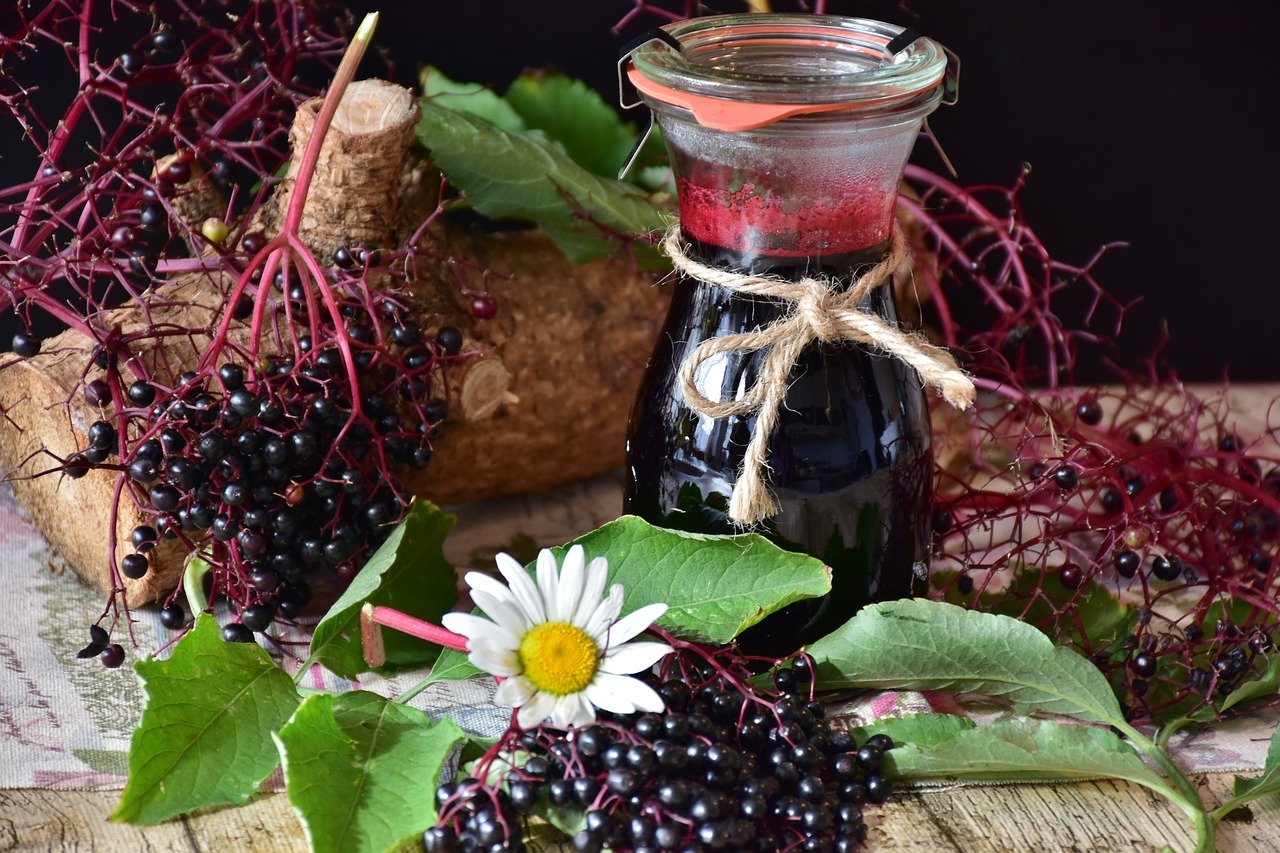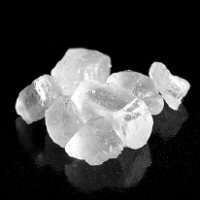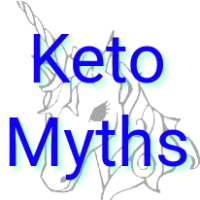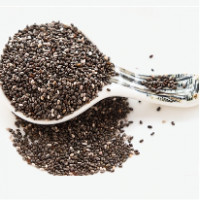
I believe there is much to be learned by being open-minded, but as Terry Pratchett says in “Diggers,” The trouble with having an open mind, of course, is that people will insist on coming along and trying to put things in it.
My own thought on this topic is one ought not be so open minded that one’s brains fall out. Unfortunately, it seems to me that much of the “natural foods” community is on the brink of this. I can generate a hypothesis from anecdotes, but then I need to hit the research literature to see if there’s anything to back it up.
We can learn from old wives tales, some of which turn out to be useful; empirical evidence is where science begins after all. For me, one of the most useful ideas I’ve discovered is elderberry syrup as a home remedy for flu. There’s references at the end of this post for those who may be skeptical, or just curious about how it works, to investigate further. Note: there are several species of elderberry, but the one that has been recommended and studied is the European black elderberry, Sambucus nigra.
The research convinces me that elderberry syrup both prevents flu (often better than a flu vaccine) and also reduces influenza a and b symptoms duration if you succumb (equally as well as the prescription anti-viral, Tamiflu). Additionally, there is evidence that elderberry is effective against the most common bacteria responsible for pneumonia, the most serious complication resulting from influenza.
In the studies I’ve seen, the only side effect reported was that one study participant disliked the taste; this is an advantage in implementing Hippocrates’ advice, “Let food be thy medicine and medicine be thy food.”
I have taken a daily dose of elderberry syrup throughout flu season for several years now, and the few times I’ve actually gotten sick, the bottle sits on my nightstand next to my fluids and thermometer so I can take a shot every time I awaken from my illness-induced stupor.
A few years back, I switched to using elderberry juice on the hypothesis that it was highly unlikely that the additional sugar in a syrup was providing the flu-fighting benefits, and as a diabetic, I didn’t need the syrup bit.
But working hard to reverse my diabetes via fasting and keeping carbs as low as possible when I did eat, I was less fond of even the juice. I mean, the dose is small, I generally took about a tablespoon a day for prevention, it’s not like drinking a glass of OJ.
But when I’m sick, I take rather a lot throughout the day, I can go through half a bottle in a week. And I don’t need those carbs.
Last October, I was thinking about starting up my elderberry routine again, it seemed there must be a better way than the juice.
On October 30, I had a small epiphany:
This cracked me up!
So I was thinking that it’s about time to start doing elderberry juice, which I bought instead of the syrup because it’s less carby. Still, I’m trying to get my bG down, so it’s carbier than I’d like.
Someone mentioned doing a tincture, and I thought about that, but honestly – the idea of drinking alcohol daily doesn’t appeal. Once upon a time, I tried drinking red wine daily to help with heart disease and it turns out, I just don’t want to do that. I tend to drink maybe 3 or 4 times a year, so a shot of elderberry vodka daily didn’t seem to be something I wanted to do.
And then Amanda was live the other day making flavored vinegars and I started thinking about the various things I could do with vinegar, and just now, it occurred to me maybe I could make an elderberry vinegar.
And so I went to Google and typed in “elderberry vinegar” and while I was waiting for the response, it occurred to me that if anyone’s made an elderberry vinegar, it’s Amanda.
And Google agreed with me, the first result was: https://freshbitesdaily.com/elderberry-vinegar/ –
I love to keep an elderberry vinegar around to toss into salads, particularly using this elderberry vinaigrette dressing recipe. This is extremely simple to make.Bahahaha! Of course it’s Amanda!
For me, an additional advantage is getting in the ACV. I realize ACV is big among the real food folks for the probiotic effects, but I just don’t like it. I can pretty much only tolerate it for cooking pork, where the heat probably kills off the beneficial bacteria anyway.
For vinegar, I mostly use red wine vinegar, which I grew up with, or when that doesn’t work in a particular recipe, plain, distilled white vinegar. I just don’t like ACV; heck, I don’t even like apple juice.
But elderberry-infused ACV is pretty yummy.
Unlike Amanda, I don’t live where I can gather elderberries for free. I bought dried elderberries from Amazon.
Making the vinegar was easy, I just put about 3/4 cup of dried elderberries in a quart jar, topped off with ACV, put in the back of a cabinet for a few weeks to infuse, then strained off the vinegar to use, composting the berries.
While waiting for it to infuse, I used more of the dried berries to make elderberry tea daily.
But this year, given it’s August as I write this, I can make a big batch of the vinegar in advance to get me through flu season.
I suppose dosing is a bit problematic; I’ve no idea what is equivalent to a standardized extract, but given I’ve no problem downing a shot diluted daily, it’s probably enough in a hand-waving sort of way.
Yes, that’s not very scientific of me, but I’ll make up for it by giving you some references below. 😉
References
Zakay-Rones Z, Thom E, Wollan T, Wadstein J. Randomized study of the efficacy and safety of oral elderberry extract in the treatment of influenza A and B virus infections. J Int Med Res. 2004;32(2):132-140. PubMed https://pubmed.ncbi.nlm.nih.gov/15080016/ (accessed Aug 2020)
Krawitz C, Mraheil MA, Stein M, et al. Inhibitory activity of a standardized elderberry liquid extract against clinically-relevant human respiratory bacterial pathogens and influenza A and B viruses. BMC Complement Altern Med. 2011;11:16. PubMed https://pubmed.ncbi.nlm.nih.gov/21352539/ (accessed Aug 2020)
Kinoshita E, Hayashi K, Katayama H, Hayashi T, Obata A. Anti-influenza virus effects of elderberry juice and its fractions. Biosci Biotechnol Biochem. 2012;76(9):1633-8. PubMed https://pubmed.ncbi.nlm.nih.gov/22972323/ (accessed Aug 2020)
Golnoosh Torabian, Peter Valtchev, Qayyum Adil, Fariba Dehghani. Anti-influenza activity of elderberry (Sambucus nigra). J Funct Foods. 2019 Mar;54:353-360. ScienceDirect https://www.sciencedirect.com/science/article/abs/pii/S1756464619300313 (accessed Aug 2020)
Roschek B Jr, Fink RC, McMichael MD, Li D, Alberte RS. Elderberry flavonoids bind to and prevent H1N1 infection in vitro. Phytochemistry. 2009;70(10):1255-1261. PubMed https://pubmed.ncbi.nlm.nih.gov/19682714/ (accessed Aug 2020)
Tiralongo E, Wee SS, Lea RA. Elderberry Supplementation Reduces Cold Duration and Symptoms in Air-Travellers: A Randomized, Double-Blind Placebo-Controlled Clinical Trial. Nutrients. 2016;8(4):182. PubMed https://pubmed.ncbi.nlm.nih.gov/27023596/ (accessed Aug 2020)
Barak V, Halperin T, Kalickman I. The effect of Sambucol, a black elderberry-based, natural product, on the production of human cytokines: I. Inflammatory cytokines. Eur Cytokine Netw. 2001;12(2):290-296. PubMed https://pubmed.ncbi.nlm.nih.gov/11399518/ (accessed Aug 2020)
Huang T, Chen X, Zhao C, et al. Sialylated immunoglobulin G can neutralize influenza virus infection through receptor mimicry. Oncotarget. 2016;7(13):15606-15617. PubMed https://pubmed.ncbi.nlm.nih.gov/26870994/ (accessed Aug 2020)




